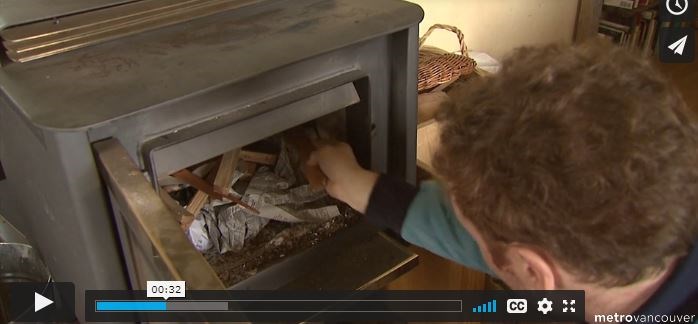Starting this Saturday, May 15, Metro Vancouver is banning the use of indoor, residential wood-burning appliances for four months in a bid to clear the air this summer.
Until Sept. 15, the use of such appliances will be prohibited, unless wood-burning is the only source of heat in the residence.
Last year, Metro Vancouver’s board of directors adopted a new Residential Indoor Wood Burning Emission Regulation Bylaw to phase out the “use of high-emissions wood-burning appliances in the region by 2025,” with some exemptions.
It will still be allowed in the case of emergencies and for those living off-grid in rural parts of the region.
Additional requirements, including appliance registration, will be introduced between 2022 and 2025.
Outside of the prohibition period, the bylaw requires residents who use wood-burning appliances to follow “Best Burning Practices,” as defined in the bylaw and on Metro Vancouver’s website.
“Our goal is not to stop the use and enjoyment of wood-burning appliances, but to establish and enforce an appropriate emissions standard that will result in improved air quality for the region’s residents,” said Adriane Carr, chair of Metro Vancouver’s Climate Action Committee.
“The regulation is rolling out in phases and is designed to avoid hardship for rural residents, low-income households and people who use wood as their only source of heating.”
According to Metro Vancouver (MV), residential wood smoke is the most significant source of fine particulate matter (PM2.5) emissions in the region, contributing more than a quarter of the annual total PM2.5 emissions.
These tiny particles, says MV, penetrate deep into a person’s lungs and bloodstream, and due to their small size, can easily enter buildings and be detrimental to health — particularly for infants, the elderly, and people with diabetes, lung disease or heart disease.
The bylaw was developed after extensive consultation with residents, businesses and public health authorities, and complements a variety of education and incentive programs that Metro Vancouver has in place to reduce wood smoke from indoor wood-burning stoves and fireplaces.
Metro Vancouver’s Wood Stove Exchange Program offers up to $400 so that residents can replace their older, uncertified wood-burning appliances with ones that are more energy-efficient and comply with more stringent emissions standards.
Metro Vancouver operates an extensive Air Quality Monitoring Network with 31 permanent stations and one mobile unit.
The regional district sets air quality objectives, responds to air quality complaints and enforces bylaws pertaining to air emissions from industry, businesses and residences. Residents can monitor regional air quality using AirMap.



